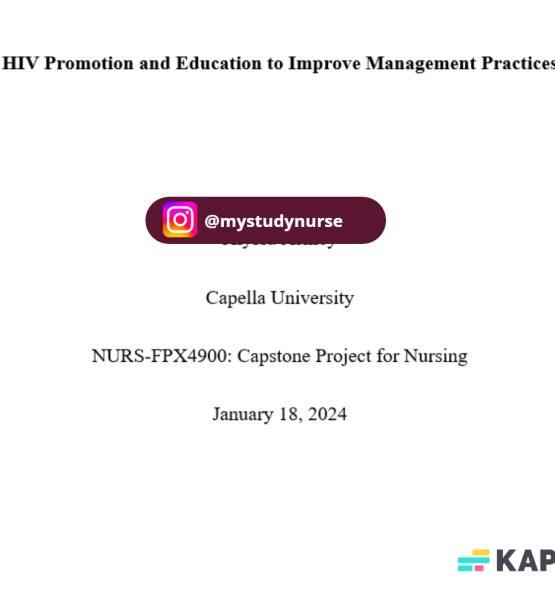
HIV Promotion and Education to Improve Management Practices
Alyssa Ashley
Capella University
NURS-FPX4900: Capstone Project for Nursing
Dr. Deanna Golden
January 18, 2023
Availability:In Stock
In this session, the audience has the opportunity to access information on best practices for controlling HIV symptoms. I aim to empower patients to be responsible for monitoring and controlling symptoms. Patients understand tailored interventions including medication adherence, exercise, lifestyle, and diet necessary to improve quality of life. Increased HIV promotion and education promotes individual and collective commitment to identifying resources and tailored self-management practices for improving quality, safety, and cost of care. The learning outcomes from this educational session include;
• Knowledge of self-management practices and the need to engage qualified healthcare professionals to help you design health goals.
• Knowledge of community resources appropriate for patients living with HIV.
• The relevance of telehealth in strengthening care coordination and patient engagement across the continuum.
• The need for patients to utilize provisions of the Affordable Care Act to reduce cost of HIV treatment.
HIV Self-Management
I encourage patients to identify resources that support successful self-management. The focus is on patient-centered interventions that make it possible to identify challenges associated with HIV management and solutions necessary for preventing undesirable disease progress.
• Individuals become more responsible for their health and well-being.
• Reduce the risk of delayed or postponed care.
• Patients able to identify and utilize community resources to improve quality of life.
• Patients seek accurate and complete information that matches their values and preferences.
• Patients embrace positive health-seeking behaviors across the continuum.
Self-care Management Practices
• Follow doctor’s orders about your prescriptions and personalized health goals. Take HIV medication exactly as prescribed by your doctor since skipping even one day of medication may give the virus an opportunity to become resistant to the drugs (Crowley & Rohwer, 2021). In this sense, take prescriptions at the same time every day, and always have the recommended medication with you to avoid missing a dose.
• Do not abuse drugs or alcohol since they contribute to feelings of depression and interfere with the immune system. Avoiding drug abuse prevent cognitive impairment, which is important in minimizing HIV-related anxiety and fear.
• Regular physical exercise, such as walking, biking, running, and swimming keeps you physically fit, keeps depression in check, and helps the immune system (Crowley & Rohwer, 2021).
• Mental exercise such as a daily crossword puzzle or playing brain-challenging games help maintain your cognitive health.
• Maintain a balanced diet of whole, fresh foods, including the following: fresh fruit and vegetables and low-fat dairy products, including milk and yogurt. Other nutritional requirements are lean proteins, such as beans, nuts, fish, eggs, and poultry, and carbohydrates, like rice, potatoes, and bread for energy.
• Communication and collaboration determine nurses, physicians, and nutritionists’ willingness to initiate consultations and engagements that encourage positive behavior change and better treatment outcomes.
• Encourage adherence to recommended prevention and treatment interventions with the goal of viral suppression.
• Excellent interactions among healthcare professionals and patients produce positive knowledge and attitudes about testing, risk of HIV infection, self-management, and other aspects that improve decision-making (Crowley & Rohwer, 2021).
• Link patients to primary care providers and specialists, and reduce stigma associated with HIV.
The Affordable Care Act and HIV Management
• The Affordable Care Act (ACA) strengthens interdisciplinary collaboration between primary care providers, specialists, and other stakeholders committed to reducing social and economic burden associated with HIV (Satre et al., 2020).
• ACA promotes efficient utilization of health resources to allow more people to benefit from incentives available to reduce the cost of care (Ginossar et al., 2021).
• Patients and families benefit from savings on medications, access to preventive care, screening, and counselling that support self-care.
• The Affordable Care Act also enhances access to accurate and complete information on services available to prevent undesirable disease progression. The access to information enhances equity in accessing prescription drugs, preventive services, mental health care, and HIV management.
• Patients benefit from coordinated care designed to strengthen the quality of care when managing complex conditions.
Community Resources
• Antiretroviral Treatment Access Network: Links HIV positive individuals with essential health services such as primary care providers and specialists. The resource keeps patients engaged where case managers build relationships, understand health goals, and help individuals feel comfortable across the continuum (Watson et al., 2018). The network also engages patients about necessary medical care and social services available to improve quality of life.
• Community HIV Medication Program: Designed to reduce out-of-pocket costs associated with ART. Patients benefit from increased access to medical care to alleviate financial burden of HIV.
• Hope and Help platform: Enhances access to medical and non-medical case management. The resource facilitate access to counseling and food pantry services that improve medication adherence and increase access to services.
Reviews
There are no reviews yet.